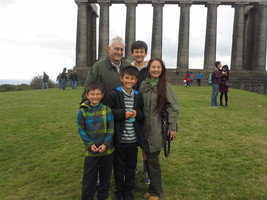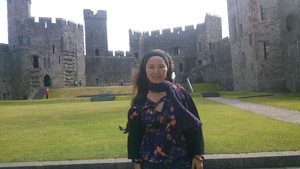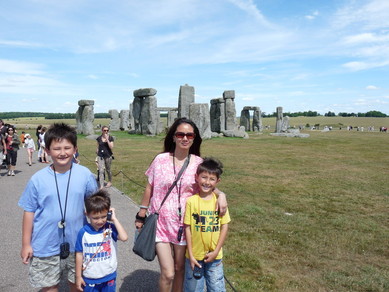
Our education and experience
Bin Tan Davidson
Background:
My name is Bin Tan Davidson and I was born in China but now live in England with my English husband and three masters. I have always had singing, dancing and performance in my life, and I have an enduring love for music.
In China I won a music scholarship to Wuhan Conservatory of Music where I gained B.Mus.specialising in teaching and also went on to gain a Master’s degree in PianoTeaching and Performance. During my time at the Conservatory I also taught music and both primary and secondary levels.
For 15 years I have run a piano studio teaching children piano from 4 up to 18 and up to Grade
8. My work philosophy is to generate a deep love of music in children as this not only helps shape growing minds but transforms the heart and soul as well.
When I became a mother, just like mothers all over the world, I wished to give the best to my children and put wholeheartedly my passion for early children’s
education. My belief is that the best gift you can give your children is to instil a love of music in the early years and then support your children as they pursue and develop that love through the
rest of their life. It would be my honour to share all my knowledge and spirit with you and your child to “Dream possible Dreams.”
Experience:
2015 Director UKSinoGuild educational projects
2014-Multisensory Mandarin learning
Musicianship through Kodaly and Dalcroze approach
2011 - present
Implement of Colourstrings approach , Develop pre-instrument program and piano programmes from early ages
2010
Diractor of project " Built in piano programm at primary school along side their acadmic education".Training Music teachers at Wuhan YuCai Primary School. dirator of "Piano group teaching" and "piano ensenmble performance"
2005 - 2010
Director of LittleMusician Studio, trainning student take Trinity Guildhall exam.
Dulwich College ShangHai piano teacher
2004-2005
Diractor "Improve piano teaching" project. Invited N.Jane .Tan who director of The W.P.P institute USA ,Give teacher trainning ,master class,and piano pedagogics lecture.Been a interpreter on the scene travel around china at 4 big city ShenZhen/ShangHai/WuHan /Fuzhou.
2002 - 2006
Individual teacher for private students
Shanghai Yuan Pei School Piano teacher
2002 - 2004
Accompanist for vocal coach at Shanghai Music Conservatory
Piano teacher at Kong Xiang Dong Arts Centre
1997-2001
group piano teacher in WuHan conservatory
1992 - 1997
privite Piano and music teacher in Wuhan
Education:
1982-1985 WuHan Teacher trainning school
1987 - 2000 Wuhan Conservatory
Scholarship to study music 1987 - 1989
Bachelor of Music Teaching 1994 -1997
Masters Degree in Piano - Teaching and Performance 1997 - 2000
“The single most important thing in education is for each person to find at least one thing that he/she connects to, gets excited by, feels motivated to spend more time with” (Gardner, 1992). For many children, music is that thing. According to Howard Gardner there are at least eight different types of intelligence. He cites music as the first of the multiple intelligences to become functional in a person.
Even before the brain research findings, teachers and parents have taught the alphabet A B C D E F G to children with the help of a song. Based on the brain research findings and explore ,Now we understand Why and how music and movement can be used to enhance memory skills and retention and language development. With the help of cat scans, we have been able to see what happens to the brain when listening to music: Each component of music affects a different part of the brain, a familiar song activates the left frontal lobe, timbre the right frontal lobe, and pitch the left posterior. One side of the brain processes the word while the other processes the music – activating the whole brain ensures better retention. Short-term memory has the ability to hold only seven bits of information. If bits of information are bonded together, as in a song, it can be processed as one piece. By condensing the information, the brain is able to receive and process more. One must acknowledge the importance of music in the children's deveiopment.
Music gets the whole child involved in the process of learning. Learning style researchers, have found that as many as 85 percent of people are kinesthetic learners. (Einstein was a kinesthetic learner.) Combining this with the facts that 99 percent of what is learned is unconscious, we must realize the impact of music and movement activities. While marching or singing, one is usually not thinking about what they are learning. Music activities prepare the brain for more difficult tasks needed later by preparing the brain to work from both hemispheres. For example, though printing uses one side of the brain, cursive uses both. Music helps the brain to process higher-level thinking. Half the population does not reach the Piagetian stage of formal thinking.
Evidence shows that one-third does not reach concrete thinking. Music is a tool to help wire the brain to reach this higher level of thinking. When we put instruments in a child’s hands in the early years, we are teaching them an activity that is positive and will last them a lifetime. What a wonderful gift to give our children!



